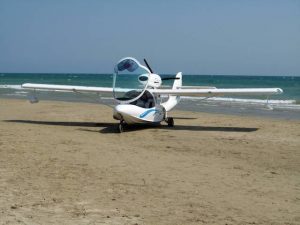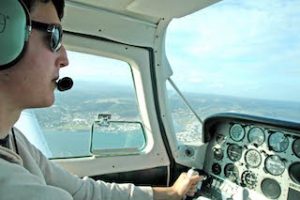Performance Evaluation In Line Oriented Flight Training Programs
 Line oriented flight training has become a cornerstone of modern pilot training, designed to simulate real-world flight conditions and enhance the skills required for safe and efficient flight operations. Central to LOFT is the performance evaluation process, which assesses pilots’ abilities in handling complex scenarios, decision-making, and crew resource management. This article delves into the various aspects of performance evaluation during LOFT programs, exploring its importance, methods, and benefits, and how it contributes to improving pilot proficiency and aviation safety.
Line oriented flight training has become a cornerstone of modern pilot training, designed to simulate real-world flight conditions and enhance the skills required for safe and efficient flight operations. Central to LOFT is the performance evaluation process, which assesses pilots’ abilities in handling complex scenarios, decision-making, and crew resource management. This article delves into the various aspects of performance evaluation during LOFT programs, exploring its importance, methods, and benefits, and how it contributes to improving pilot proficiency and aviation safety.
Performance evaluation in LOFT
Performance evaluation in LOFT is crucial for several reasons:
- Ensuring competence and readiness: Evaluating pilot performance during line oriented flight training programs ensures that pilots are competent and ready to handle real-world flight scenarios. It helps verify that pilots have the necessary skills and knowledge to manage complex situations, make informed decisions, and effectively communicate with their crew and air traffic control.
- Identifying strengths and weaknesses: Performance evaluations help identify pilots’ strengths and areas for improvement. By assessing their handling of various scenarios, instructors can provide targeted feedback and recommendations to address specific weaknesses, leading to more focused and effective training.
- Enhancing safety: Regular performance evaluations contribute to aviation safety by ensuring that pilots maintain high standards of performance and adhere to safety protocols. By identifying and addressing potential issues before they occur in real flights, LOFT programs help prevent accidents and incidents.
- Supporting continuous improvement: Performance evaluation is an integral part of the continuous improvement process in pilot training. By regularly assessing performance and providing feedback, LOFT programs promote ongoing development and refinement of pilots’ skills, ensuring they remain proficient and adaptable.
Methods of performance evaluation in LOFT
Several methods are used to evaluate pilot performance during LOFT sessions. Each method offers unique insights into different aspects of flight operations and pilot capabilities.
-
Scenario-based assessment
LOFT programs utilise scenario-based assessments to evaluate pilots’ performance in realistic flight scenarios. These scenarios are designed to mimic real-world conditions, including weather, air traffic, and system failures. Pilots are assessed on their ability to handle these scenarios effectively, including their decision-making, problem-solving, and operational skills.
-
- Scenario design: Scenarios are carefully designed to reflect the complexity and variability of real flight operations. They may include normal operations, abnormal situations, and emergencies. The design process involves creating detailed scripts, incorporating relevant variables, and ensuring that scenarios are challenging and realistic.
- Performance metrics: During scenario-based assessments, pilots are evaluated on various performance metrics, including:
- Decision-making: The ability to make timely and appropriate decisions based on the scenario’s demands.
- Procedural adherence: Following established procedures and protocols during normal and emergency situations.
- Task management: Effectively managing multiple tasks and priorities, including cockpit duties and communication.
- Situational awareness: Maintaining awareness of the aircraft’s position, environment, and potential hazards.
2) CRM evaluation
Crew resource management evaluation is a critical component of LOFT performance assessment. CRM focuses on the effectiveness of communication, teamwork, and resource management within the cockpit. Pilots are evaluated on their ability to work collaboratively with their co-pilot and manage available resources to achieve safe and efficient flight operations.
-
- Communication skills: Effective communication is essential for successful CRM. Pilots are assessed on their ability to convey information clearly and accurately, both with their co-pilot and with ATC. This includes issuing and responding to radio calls, sharing relevant information, and providing clear instructions.
- Teamwork and coordination: Pilots are evaluated on their ability to work as a team, including delegating tasks, resolving conflicts, and supporting each other. Effective teamwork involves mutual respect, collaboration, and a shared focus on achieving flight safety and efficiency.
- Resource management: CRM evaluation also assesses pilots’ ability to manage available resources, including flight instruments, checklists, and crew support. Effective resource management ensures that pilots can handle tasks efficiently and make informed decisions based on accurate information.
3) Technical skills assessment
Technical skills assessment focuses on pilots’ proficiency in operating aircraft systems and performing specific procedures. This includes evaluating their ability to handle aircraft controls, manage systems, and perform flight maneuvers.
-
- Aircraft handling: Pilots are assessed on their ability to handle the aircraft safely and effectively, including performing takeoffs, landings, and in-flight manoeuvres. This assessment includes evaluating their control inputs, adherence to procedures, and response to changing flight conditions.
- System management: Evaluation of system management involves assessing pilots’ ability to operate and troubleshoot aircraft systems, such as navigation, autopilot, and communication systems. This includes handling system malfunctions and ensuring proper functioning of critical systems.
- Procedural knowledge: Pilots are evaluated on their knowledge of and adherence to standard operating procedures, including checklists, emergency protocols, and regulatory requirements. This assessment ensures that pilots follow established procedures and maintain high safety standards.
4) Simulation-based evaluation
LOFT programs often use high-fidelity flight simulators to evaluate pilot performance. Simulators provide a realistic and controlled environment for assessing various aspects of flight operations.
-
- Simulator features: Flight simulators used in LOFT programs are equipped with advanced features, including realistic cockpit layouts, motion systems, and visual displays. These features contribute to a highly immersive training experience, allowing pilots to experience and respond to a wide range of scenarios.
- Real-time monitoring: During simulator-based evaluations, pilots’ performance is monitored in real-time using various tools and systems. Instructors can observe pilot actions, collect performance data, and provide immediate feedback based on the evaluation.
Benefits of performance evaluation in LOFT
Performance evaluation during LOFT programs offers several key benefits for pilots, training organisations, and aviation safety.
- Objective assessment of skills: Performance evaluation provides an objective assessment of pilots’ skills and capabilities. By using standardised metrics and evaluation criteria, LOFT programs ensure that performance assessments are fair and consistent, providing an accurate representation of pilots’ abilities.
- Targeted feedback and improvement: Evaluation results offer valuable insights into pilots’ strengths and areas for improvement. Instructors can provide targeted feedback and recommendations based on performance data, helping pilots focus on specific areas for development and refinement.
- Enhanced training effectiveness: Performance evaluation enhances the effectiveness of LOFT training by ensuring that pilots receive relevant and challenging scenarios. By assessing performance and providing feedback, LOFT programs help pilots develop the skills and knowledge needed for successful real-world flight operations.
- Promoting safety and compliance: Regular performance evaluations contribute to aviation safety by ensuring that pilots adhere to safety protocols and maintain high performance standards. By identifying and addressing potential issues before they occur in actual flights, LOFT programs help prevent accidents and incidents.
- Facilitating career development: Performance evaluation supports career development by providing pilots with a clear understanding of their progress and areas for improvement. This information can be used for career planning, promotional opportunities, and continuous professional development.
Implementing effective performance evaluation in LOFT
To ensure the effectiveness of performance evaluation in LOFT programs, several best practices should be followed:
- Developing clear evaluation criteria: Clear and well-defined evaluation criteria are essential for accurate and consistent performance assessment. Criteria should be based on relevant metrics, including decision-making, procedural adherence, and CRM skills. Instructors should use these criteria to assess pilot performance objectively and fairly.
- Providing constructive feedback: Constructive feedback is crucial for helping pilots understand their performance and areas for improvement. Instructors should provide specific, actionable feedback that focuses on both strengths and weaknesses, offering guidance on how to address identified issues.
- Utilising advanced evaluation tools: Advanced evaluation tools, such as flight data monitoring systems and performance analysis software, can enhance the accuracy and efficiency of performance assessment. These tools provide valuable insights into pilot performance and help instructors make informed evaluations.
- Encouraging self-assessment and reflection: Encouraging pilots to engage in self-assessment and reflection can complement formal performance evaluations. Self-assessment allows pilots to evaluate their own performance, identify areas for improvement, and set personal development goals.
- Fostering a supportive learning environment: A supportive learning environment promotes effective performance evaluation and development. Instructors should create an atmosphere of trust and collaboration, encouraging open communication and a willingness to learn from feedback.
Future of performance evaluation in LOFT
As technology and training methodologies continue to evolve, the future of performance evaluation in LOFT programs will be shaped by several key trends:
- Integration of advanced technologies: The integration of advanced technologies, such as Artificial Intelligence and Virtual Reality, will enhance performance evaluation by providing more sophisticated tools and simulations. AI can offer real-time performance monitoring and adaptive scenario generation, while VR can create immersive training environments for more accurate assessments.
- Increased focus on human factors: The future of performance evaluation will place greater emphasis on human factors, including stress management, cognitive workload, and behavioural patterns. Evaluating these aspects will provide a more comprehensive understanding of pilots’ performance and its impact on flight operations
- Personalised training and evaluation: Personalised training and evaluation will become more prevalent, with tailored scenarios and feedback based on individual pilots’ needs and progress. This approach will ensure that training remains relevant and effective, addressing specific areas of development for each pilot.
- Enhanced data analytics and reporting: Enhanced data analytics and reporting tools will provide deeper insights into pilot performance, enabling more detailed and actionable assessments. These tools will help instructors identify trends, track progress, and make data-driven decisions to improve training outcomes.
Performance evaluation in LOFT
Performance evaluation is a critical component of Line Oriented Flight Training programs, providing valuable insights into pilots’ abilities, decision-making, and CRM skills. By utilizing various evaluation methods, including scenario-based assessments, CRM evaluation, technical skills assessment, and simulation-based evaluation, LOFT programs ensure that pilots are well-prepared for real-world flight operations.
The benefits of performance evaluation extend to pilots, training organizations, and aviation safety, promoting competence, targeted improvement, and continuous development. As technology and training methodologies evolve, the future of performance evaluation in LOFT programs will continue to advance, incorporating new tools and approaches to enhance training effectiveness and support pilot proficiency.
Through effective performance evaluation, LOFT programs contribute to the ongoing development of skilled and capable pilots, ensuring that they are equipped to handle the complexities of modern flight operations with confidence and safety.










